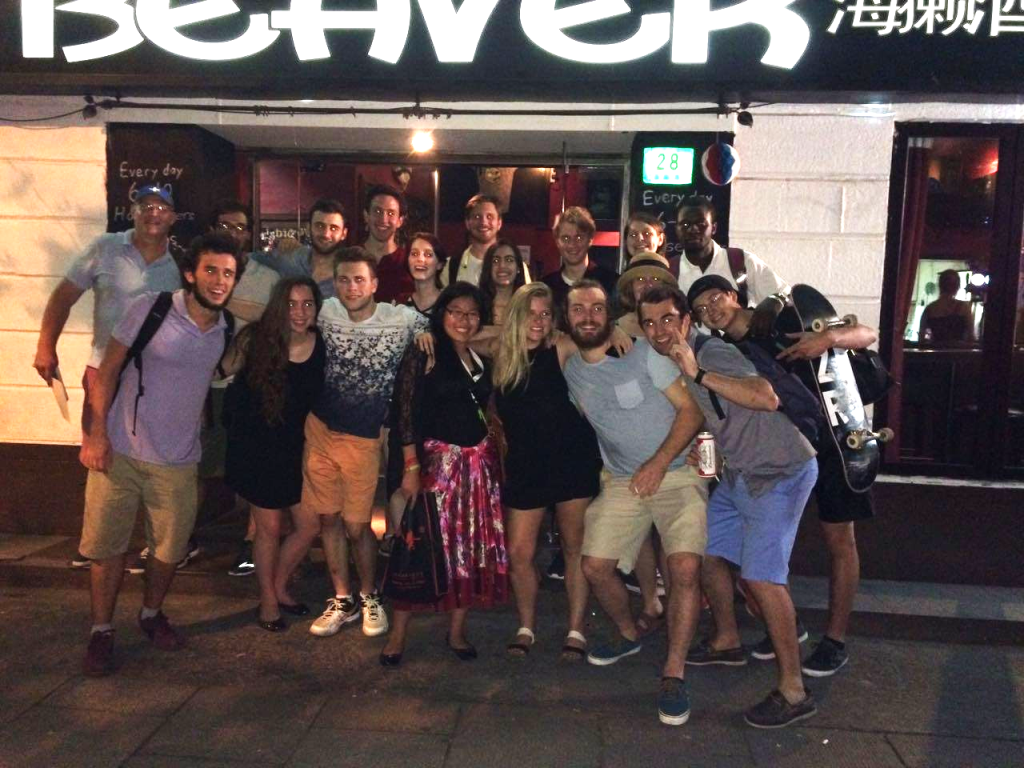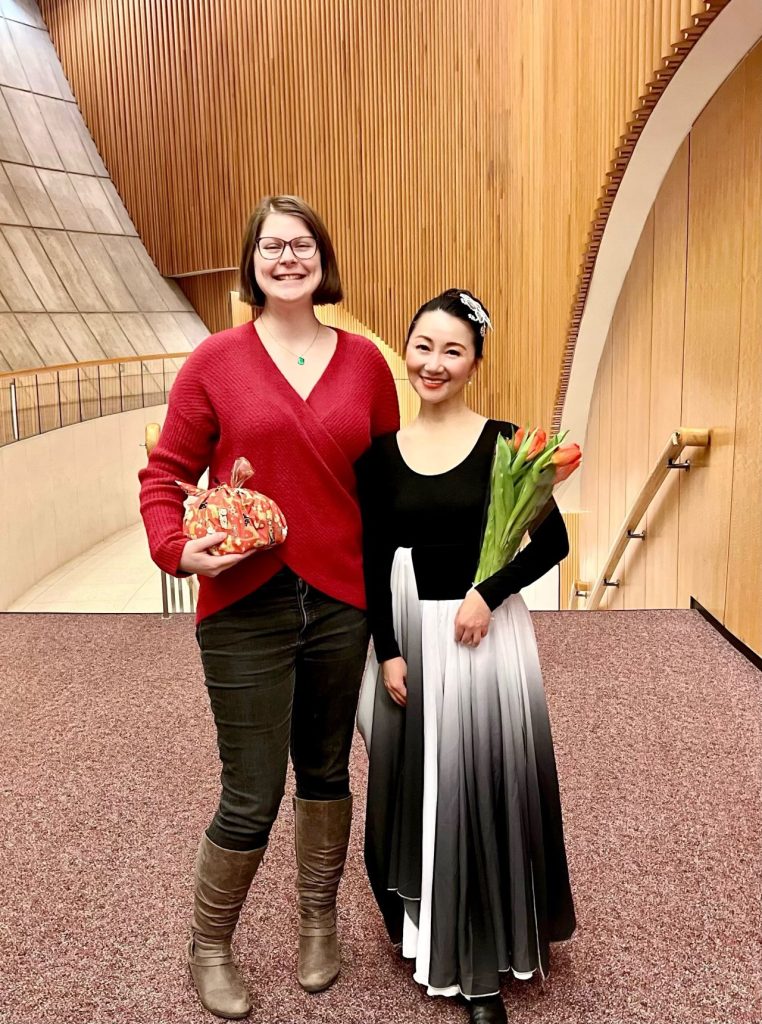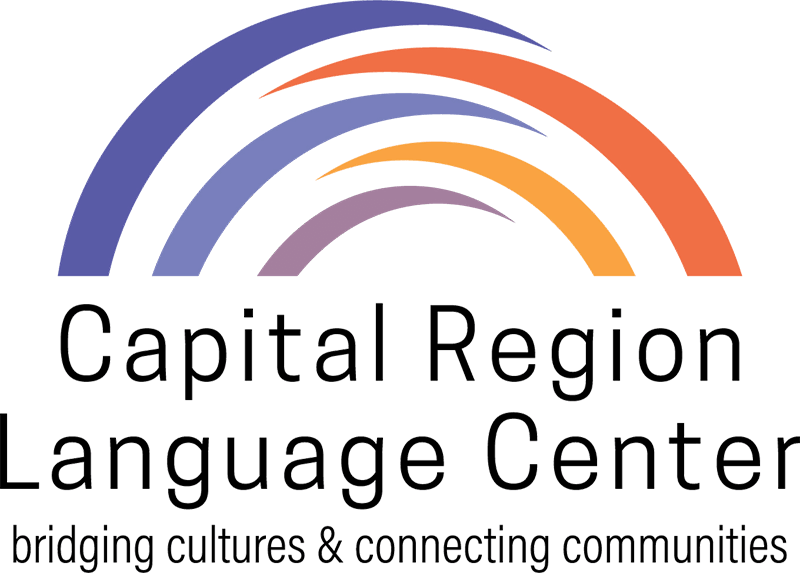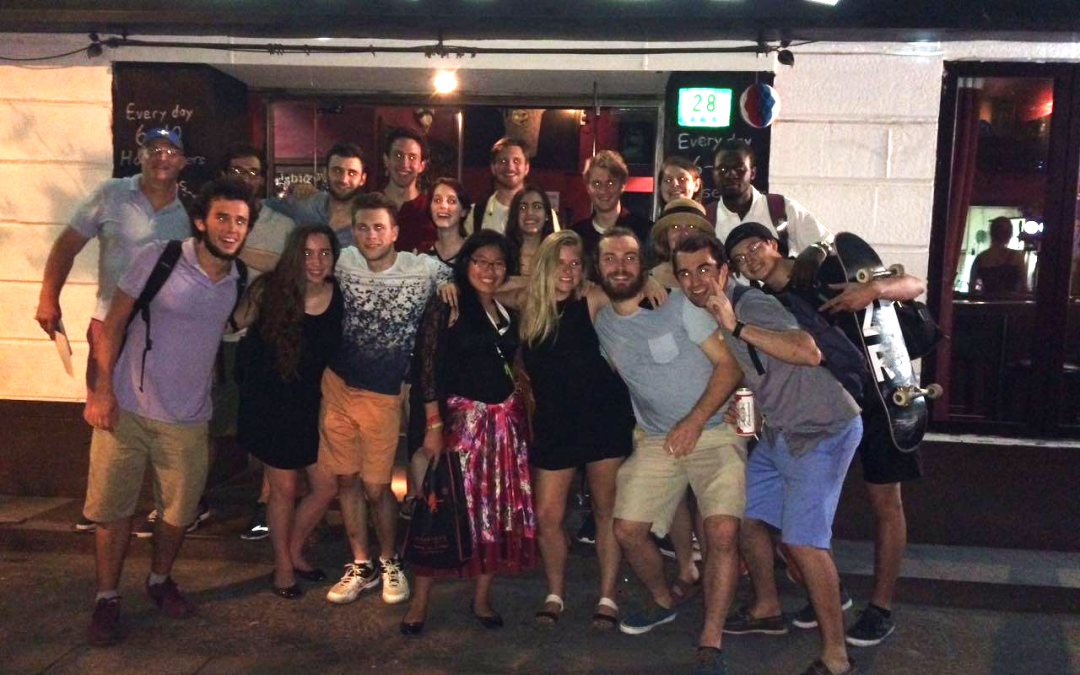After a Semester in Shanghai in College, Callie Browning is Studying One-On-One with Mandarin Chinese Instructor Xuehan Liu to Boost Her Language Skills Before Returning to China.
Callie Browning knows that studying Mandarin Chinese at Capital Region Language Center could help her career in the gaming industry one day. However, the 28-year-old says recently passing the HSK, China’s national proficiency exam for non-native speakers, was a personal goal.
As Director of Recruiting for Wolfjaw Studios, a video game company in Troy, NY, Browning sources talent from around the world. Her interest in the Chinese language and culture, however, started in college.

Browning, visiting Shanghai as part of a student exchange while attending Champlain College. She is outside of a small garden and shrine area at the YangZhou Social Welfare Institute. She and her fellow students brought gifts to children in the orphanage there.
Studying in Shanghai
A Georgia native, she came to Vermont’s Champlain College to study international business. Eager to travel, in 2015 she joined a group of 20 Champlain students in a Freeman Grant Foundation program. They spent a semester in Shanghai, China, where they lived, interned with Chinese companies and studied at Fudan University for about 10 weeks.
“While I was there, I really loved learning Chinese,” she explains. “My brain clicked in a weird way. Mandarin just made sense to me in a way that Spanish and French never did.”
Browning and a friend would study together, then challenge themselves by going to a restaurant and ordering only in Chinese.
“People were willing to simplify their language in order to speak with me,” she recalls. “I had a very positive experience with the language there.”
Back at Champlain, the college didn’t offer Chinese, so Browning wasn’t able to continue her studies.
Instead, she got very involved in the gaming scene.
“I actually didn’t know Champlain was a big gaming college until I got there,” she admits. “I went because of the study abroad programs.”

The group of Champlain College students that Callie Browning traveled with to China. Champlain’s school mascot is a Beaver, so when they discovered a bar called “The Beaver” in Shanghai, they visited.
A Gig in Gaming
As a work-study student in Champlain’s Career Services office, she interacted with video game developers and other gaming companies who came to campus to recruit new hires.
“I was trying to help all my friends get jobs,” she explains.
Eventually, she landed one of her own. A contact at Activision Blizzard – Vicarious Visions in Albany reached out about a junior recruiting position there.
Four days later, she started. Then, 18 months after than, she moved to another local game developer, Wolfjaw Studios in Cohoes, where she’s been the past four years. At first, she ‘did a little bit of everything,’ as Director of Operations before discovering her true calling: talent acquisition. Today, she serves as Director of Recruiting.
Diving Back Into Chinese Language
Browning always wanted to get back to learning Mandarin Chinese. So, when a friend, who was exploring Japanese classes, introduced her to Capital Region Language Center, she knew it was an opportunity to dive back in.
“Callie took a placement test when she started classes at CRLC,” explains Xuehan Liu, her teacher. A native of China, Xuehan came to the US to complete her doctorate in Language Education at Boston University. She went on to gain certification in Teaching Chinese to Speakers of Other Languages (TCSOL) at Teachers College, Columbia University.
“I believe in a learner-centered approach to language teaching,” Xuehan explains. So, while Callie works from a textbook series that Xuehan selected, teacher and student are in constant conversation.
“I encourage Callie to tell me what she wants to know, and I adjust the teaching content in terms of her interests and learning needs,” says says.
The pair meet twice a week for an hour for a mix of grammar, pronunciation and oral practice – as well as cultural events.
“She tries to give me real-world examples, like renting an apartment,” Browning explains. “What do they advertise? How do they talk about amenities? It is so interesting.”
For instance, Browning says there isn’t really a word for “drive through” in Mandarin because everything in China is either walk-up or takeout. Same with “laundry room” because it doesn’t exist in most Chinese homes.
Listen to Xuehan Liu teach a lesson in Mandarin Chinese on WAMC, Northeast Public Radio!
Setting Goals to Return to China
Just as she did in Shanghai, Browning continues to set language goals for herself. She recently passed two major international exams. The “HSK” or Hanyu Shuiping Kaoshi is the Chinese Proficiency Test, a six-level international standardized exam used by China to rate Chinese language proficiency for non-native speakers.
“It was scary, but I decided I’d been studying for 18 months, so let’s pay the $40, take the test and see how it goes,” she explains.
Browning passed Level Three Reading/Writing and Level One in Speaking. Now, she’s connecting her study with a trip back to China.
“Level Four is a major jump – you have to memorize about 2,000 words,” she explains. “I decided that if I can pass that test in another 18 months, then I’ll book a trip back.”
Potential Career Benefits
Liu says passing the test is a confidence boost for Browning to continue her study, but could also help her professionally one day.
“Callie’s company works with some Chinese clients, so the HSK certificate could help her seize career advancement opportunities,” she says.
Browning agrees. With the world’s largest gaming community, she says more major players are coming from China.
“Eventually, I could work with one of the Chinese studios, or if we pick up a Chinese client at Wolfjaw, use my expertise there.”
In terms of recruiting, Browning says she can see language instruction playing a larger role in the future.
“In gaming, South America, specifically Brazil and Chile are a huge, untapped market,” she explains. “I think you are going to see more US gaming companies collaborating with South American developers.”
Browning says one of her recruiting assistants is now brushing up on American Sign Language because Wolfjaw Studios recruits heavily at Rochester Institute of Technology. The school has a big gaming program and is also home to the National Technical Institute for the Deaf. She says being able to easily communicate at career fairs with deaf candidates could be a major advantage.
“I can see there being a growing need to promote language instruction in tech,” she says.

Callie Browning (left), is studying Mandarin Chinese student at Capital Region Language Center. She is with her instructor, Xuehan Liu, at The Egg in Albany in February, 2024. Liu was dancing “The Chinese Scroll.” a traditional dance at the Chinese Community Center of the Capital Region’s Lunar New Year Gala.
Benefit of Studying Mandarin Chinese With One-on-One Instruction
Browning says one-on-one instruction has been a key to her success.
“Having the individual support is really, really helpful,” she says. “For instance, I kept mixing up the pronunciation of “six” and “nine” and Xuehan was able to correct my mistake quickly.”
Plus, the classes can be scheduled around Browning’s work schedule.
Her teacher says it also helps to have a highly motivated student.
“She is not afraid to ask questions or of making mistakes,” Liu says. “And Callie likes to know the authentic expressions that Chinese people use in real life. Reading Chinese characters is usually a challenging task but Callie reads them fluently and accurately. I’m always proud of how beautifully she can read Chinese!”
While it can be tough balancing a demanding job with language study, Browning has found ways to add Chinese language into her daily routine. Whether taking a break to play a Chinese language game on her phone, listening to Chinese music while working or playing a livestream in the background at home, she says consistency is key.
“Once you get the immersion, that is when it just starts to click,” she says.
Capital Region Language Center is the area’s largest language instruction school. A New York State Certified Women-Owned Business Enterprise, we offer instruction in 13 languages, including Business English and American Sign Language, from beginner to advanced levels. Our team of more than 30 teachers provide in-person and online classes, including small group, one-on-one, business, travel and workshop formats. Learn more about the languages we teach. Or contact us about classes.



